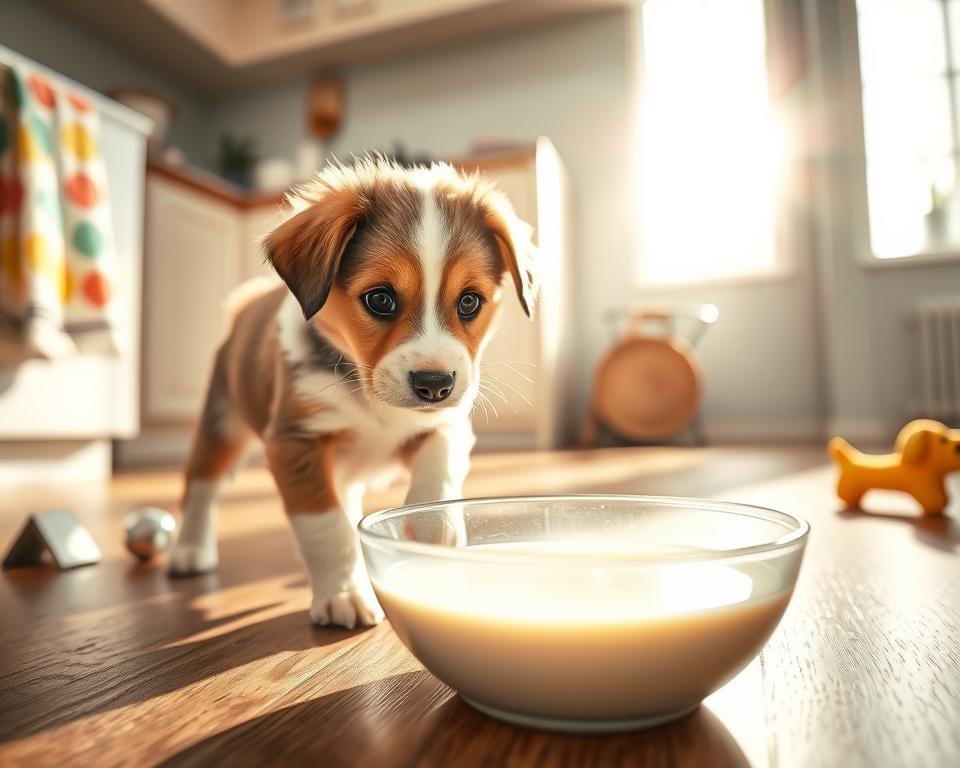As pet parents, we often wonder if puppies can safely drink milk. Puppies have different nutritional needs than adult dogs. It’s important to understand the details of milk for puppies to keep them healthy.
We’ll look into the world of milk for puppies. We’ll answer common questions and offer expert advice. This will help you make the best choices for your growing pup.
Puppies are born with lots of lactase. This enzyme helps them digest their mother’s milk. But as they grow, their lactase levels go down. This makes them more likely to get lactose intolerance.
Puppies can safely drink their mother’s milk or puppy milk replacers. But cow’s milk and other dairy products are different. They have more lactose, which can upset a puppy’s stomach. This can lead to vomiting, diarrhea, bloating, and pain in the belly.
Understanding Milk Consumption in Dogs and Puppies
Feeding puppies requires knowing about milk. A mother dog’s milk is special for her puppies. It has nutrients and antibodies that help them grow and stay healthy.
The Difference Between Mother’s Milk and Other Types
Puppy milk is different from cow’s milk or other dairy. Puppies can easily digest their mother’s milk because of a special enzyme. But, as they grow, they can’t digest milk as well.
Why Puppies Can Digest Milk Better Than Adult Dogs
Puppies can digest milk because they have more of a special enzyme. This enzyme breaks down lactose in milk. Adult dogs don’t have as much of this enzyme, so they can’t digest milk as well.
Natural Weaning Process
Puppies start to wean off their mother’s milk at 3-4 weeks. They start eating solid food and need less milk. This helps their stomachs get ready for solid food.
| Milk Source | Lactose Content | Suitability for Puppies |
|---|---|---|
| Mother Dog’s Milk | Optimal | Highly Suitable |
| Cow’s Milk | Higher | Not Recommended |
| Goat’s Milk | Moderate | Occasionally Suitable |
| Plant-Based Milk Alternatives | Varies | Not Recommended |
Even though puppies can drink milk, they can’t digest it as they get older. It’s best to talk to a vet about what to feed them. This ensures they get the right food and stay healthy.
Can Puppies Drink Milk: Safety Guidelines and Risks
Puppies can safely drink their mother’s milk. But, other milks like cow’s milk are not good for them. Cow’s milk has too much lactose and different nutrients. This can upset their stomachs, cause diarrhea, and lead to nutritional problems.
Experts say dogs can have about 1/4 cup or 4 tablespoons of milk. But, it’s important to get advice from a vet before giving milk to puppies. Puppies need their mother’s milk until they can eat solid food. After that, they don’t need cow or goat milk.
Milk is very fatty, which can increase the risk of pancreatitis in dogs. This is a serious and potentially deadly condition. Milk also has sugar, which can lead to diabetes and obesity in dogs. Many dogs can’t digest milk well, leading to nausea, vomiting, diarrhea, and stomach pain.
| Milk Type | Suitability for Puppies |
|---|---|
| Mother’s Milk | Safe and recommended until weaning |
| Cow’s Milk | Not recommended due to high lactose content |
| Goat’s Milk | Can be given in moderation, but raw goat milk poses risks |
| Non-Dairy Milks (Soy, Oat, Almond) | Not suitable for puppies |
It’s important for pet owners to know the risks and safety rules for giving milk to puppies. Talking to a vet is a good idea to make sure puppies get the right food and avoid health problems.

Lactose Intolerance in Dogs: What Pet Parents Should Know
As pet owners, it’s key to know the risks of milk for our dogs. Lactose intolerance is common in dogs, more so as they get older. This issue makes it hard for them to digest lactose, leading to stomach problems like diarrhea, vomiting, and gas.
Common Signs of Lactose Sensitivity
- Diarrhea
- Vomiting
- Bloating and gas
- Abdominal pain or discomfort
How to Identify Dairy Allergies vs. Intolerance
Distinguishing between lactose intolerance and dairy allergies is important. Dairy allergies can cause skin issues and more serious reactions. A vet’s help is essential to figure out the problem and find the right solution.
Managing Lactose Intolerance in Puppies
Puppies are very sensitive to lactose intolerance because their digestive systems are not fully developed. It’s important to avoid dairy or use lactose-free options for their health. A vet can guide on how to meet their nutritional needs without causing lactose problems.

“Milk is one of the top two leading food allergens for dogs, meaning many dogs cannot tolerate it.”
Knowing the signs of lactose sensitivity and the difference between intolerance and allergies helps pet owners make better diet choices. Always talk to a vet to create a plan for managing lactose intolerance in puppies and adult dogs.
The Truth About Cow’s Milk for Puppies
It might seem like a good idea to give your puppy cow’s milk. But, it’s not the best for their health. Cow’s milk has a lot of lactose, a sugar that puppies can’t easily digest.
About 65% of dogs can’t handle a lot of milk. This can lead to problems like bloating, gas, and stomach pain. Puppies may also vomit or have diarrhea.
On the other hand, a nursing mother’s milk has less lactose. Puppies also have more lactase, an enzyme that breaks down lactose. This helps them digest their mother’s milk better.
| Milk Type | Lactose Content |
|---|---|
| Cow’s Milk | 5% |
| Goat’s Milk | 4.2% |
| Mother’s Milk | 3% |
Even though cow’s milk isn’t ideal, there are better options. Talk to your vet about the best milk substitutes for your puppy. They can help you find the right one.
Safe Milk Alternatives for Growing Puppies
As puppies grow, they need different foods. Commercial puppy formulas are made to match mother’s milk. They give puppies the nutrients and energy they need to grow.
Commercial Puppy Formula Options
Pet parents have many commercial puppy formula options. Liquid milk replacers are easy to use but don’t last long. Powdered replacers last longer but need careful mixing to avoid problems.
When to Use Milk Replacements
Milk replacements are key for orphaned puppies or those with milk issues. They help ensure the puppy grows well.
Proper Feeding Guidelines
- Follow the manufacturer’s instructions carefully when reconstituting and feeding puppy milk replacers.
- Gradually transition the puppy to solid food as they grow, under the guidance of your veterinarian.
- Ensure the puppy is receiving adequate nutrition and hydration throughout their development.
Finding the right milk for puppies can be hard. But with the right info, pet parents can give their puppies the best nutrition. By knowing the options and following feeding guidelines, puppies can grow into healthy dogs.
“The best milk for puppies is one that closely mimics the nutritional composition of the mother’s milk. This ensures the puppy receives the optimal balance of nutrients for their growth and development.”
| Milk Type | Suitability for Puppies |
|---|---|
| Cow’s Milk | Safe in moderation but not ideal due to lactose and complex proteins |
| Goat’s Milk | Widely considered the best milk for dogs, containing fewer lactose and simpler proteins |
| Sheep Milk | Safe for dogs in moderation, often used in cheese production |
| Plant-Based Milks | Some, like unsweetened oat or soy milk, can be safe in moderation, but others like almond milk should be avoided |
While what kind of milk can puppies drink and can puppies drink milk are key, water is best for dogs. Milk and dairy should be given sparingly, with a vet’s advice.
Health Risks of Giving Regular Milk to Puppies
Puppies may seem okay with their mom’s milk, but other milk can be risky. About 65% of dogs have mild lactose intolerance, which means too much milk is bad. Cow’s milk is high in fat and sugar, causing stomach problems, diarrhea, and even pancreatitis.
As puppies get older, they can’t digest milk as well. This is because they make less lactase, the enzyme that breaks down lactose. This can cause bloating, gas, vomiting, and pain in the belly. Symptoms of lactose intolerance in dogs show up within 12 hours after they drink milk.
Also, cow’s milk doesn’t have the right nutrients for puppies. It can lead to too much or too little of important nutrients. Water is the best drink for dogs because it helps with digestion and nutrient transport.
| Milk Type | Lactose Content | Suitability for Puppies |
|---|---|---|
| Cow’s Milk | Approximately 5% | Not recommended due to high lactose content |
| Goat’s Milk | Around 4.2% | Better tolerated, but should be introduced cautiously |
| Mother’s Milk | Approximately 3% | Ideal for nursing puppies |
Always talk to a vet before giving milk or dairy to puppies. Each dog is different, and some may have more severe lactose intolerance or allergies. The safest choice is a balanced diet that supports their growth without the dangers of regular milk.
Understanding Different Types of Milk and Their Effects
Feeding puppies requires knowing the differences in milk types and their health impacts. Cow’s milk might seem like a natural pick, but it’s not always the best for puppies.
Goat’s Milk vs. Cow’s Milk
Goat’s milk is a better option than cow’s milk for puppies. It has less lactose, making it easier to digest. Yet, it’s not perfect for long-term puppy nutrition because it lacks some key nutrients.
Plant-Based Milk Alternatives
Plant-based milks like almond, oat, or soy milk should be used carefully in puppies. They often lack the nutrients puppies need and may have harmful additives. While okay for adult dogs in small amounts, they’re not good for puppies.
Always talk to your vet before adding new milks or alternatives to your puppy’s diet. The right nutrition is vital for your puppy’s growth and health.
“Moderation is key when it comes to feeding your puppy milk or milk alternatives. It’s best to stick to a high-quality, balanced puppy diet to ensure your furry friend gets all the essential nutrients they need.”
Best Practices for Feeding and Hydrating Puppies
Feeding your puppy right is key for their growth and health. Start with their mom’s milk, full of nutrients they need. As they grow, switch to a veterinarian-approved puppy formula or high-quality puppy food.
Newborns need to eat often, every 2 to 3 hours. Puppies 2 to 4 weeks old can eat every 6 to 8 hours. A 5-week-old puppy might eat three to four times a day. Use commercial milk replacers to guide feeding, like 2 teaspoons for every 4 ounces of body weight.
At 4 weeks, start moving them to puppy food. Feed them 4 times a day until they’re 6 months old. Then, cut back to 3 meals a day until they’re 9 months. After that, they can eat 2 times a day. Always follow the food packaging’s feeding amounts based on their weight and age.
Water is the best drink for puppies after they stop nursing. Don’t give them cow’s milk or other dairy because it can upset their stomach. Talk to your vet to make a feeding plan that fits your puppy’s needs.
| Puppy Age | Feeding Frequency | Meal Portions |
|---|---|---|
| Newborn – 2 weeks | Every 2-3 hours | Follow milk replacer guidelines |
| 2-4 weeks | Every 6-8 hours | Follow milk replacer guidelines |
| 5 weeks | 3-4 meals per day | Transition to puppy food |
| 2-6 months | 4 meals per day | Follow puppy food guidelines |
| 6-9 months | 3 meals per day | Follow puppy food guidelines |
| 12 months+ | 2 meals per day | Follow adult dog food guidelines |
Feeding and hydrating your puppy right is vital for their health and growth. By following these tips and talking to your vet, you can make sure your puppy gets the nutrition they need to grow strong and healthy.
When to Consult Your Veterinarian About Puppy Nutrition
As a responsible pet parent, watching your puppy’s growth and health is key. Puppies usually do well on a balanced diet. But, sometimes you might need to talk to your vet about their nutrition. It’s important to be proactive and look out for any signs of trouble.
Emergency Warning Signs
If your puppy has severe diarrhea, keeps vomiting, seems very tired, or shows signs of dehydration, it’s a big worry. These could mean a serious health issue. In such cases, you should get your vet’s help right away. They can check your puppy and give the right treatment to keep them healthy.
Professional Dietary Guidance
Puppies need special nutrients during their growth. Talking to your vet can make sure your puppy gets the right mix of nutrients. They might suggest the best puppy food or a special diet if needed.
It’s also good to have regular vet visits. This helps keep an eye on your puppy’s growth and health. Working with your vet can help you find the best feeding plan for your puppy. This plan supports their growth and avoids any nutritional problems.
When it comes to your puppy’s health and nutrition, it’s always safer to be careful. If you’re worried about can puppies drink milk or if cow milk is good for dogs, don’t hesitate to call your vet. Their advice is very valuable to help your puppy stay healthy.
Conclusion
Puppies can and should drink their mother’s milk. But, other types of milk, like cow’s milk, are not good for them. It’s best to follow the vet’s advice and use puppy formulas when needed.
As puppies grow, they should move to a balanced diet. Always put their health first and talk to experts for the right food plan.
Many dogs, including puppies, can’t digest milk well. This can cause stomach problems and other health issues. Signs include upset stomach, pain, diarrhea, and bloating.
Too much milk can lead to pancreatitis, heart problems, and obesity. It’s key to know what’s best for your puppy’s diet.
By choosing the right milk alternatives and getting vet advice, you can help your puppy grow well. Always focus on their health and happiness as they grow.
FAQ
Can puppies drink milk?
Puppies can safely drink their mother’s milk or special puppy milk replacers. But, cow’s milk and other dairy can upset their stomachs.
What are the differences between mother’s milk and other types of milk for puppies?
Mother’s milk is made just for puppies, with all the nutrients and antibodies they need. Puppies can digest it well because they have lots of lactase enzymes. But, adult dogs don’t have as much of this enzyme.
Why can puppies digest milk better than adult dogs?
As puppies grow, they lose the ability to digest milk. This is because their bodies naturally stop needing it. As they get older, they might not be able to digest milk well anymore.
Is cow’s milk safe for puppies?
No, cow’s milk is not good for puppies. It has too much lactose and different nutrients. It can make them sick, with diarrhea and upset stomachs.
What are the signs of lactose intolerance in dogs?
Signs of lactose intolerance include diarrhea, vomiting, gas, and belly pain. It’s key to know the difference between lactose intolerance and dairy allergies. Dairy allergies can be much worse.
What types of milk can puppies safely consume?
The safest milk for puppies is their mother’s milk or special puppy milk replacers. Cow’s milk and plant-based milks should be avoided or given in very small amounts.
What are the health risks of giving regular milk to puppies?
Giving regular milk, like cow’s milk, can harm puppies. It can cause stomach problems, diarrhea, and even long-term health issues. This is because of the high fat and sugar, and because it’s not a balanced diet.
When should I consult a veterinarian about my puppy’s nutrition?
See a vet if your puppy has stomach problems, isn’t growing well, or acts differently. Watch for emergency signs like bad diarrhea, vomiting, being very tired, or dehydration.



